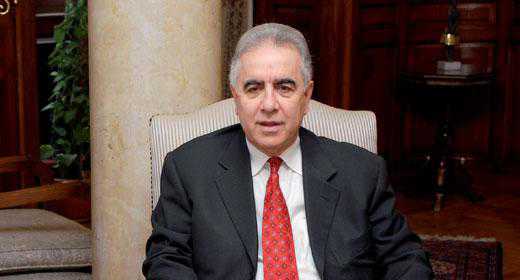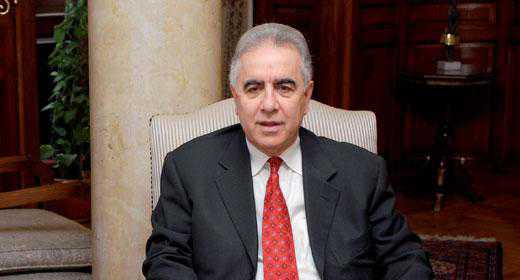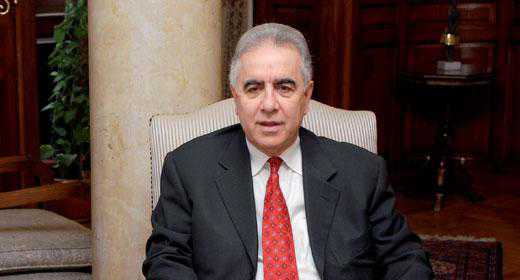




Some may have expected that the recent mass protests and unrest in Turkey would preoccupy its leaders with internal problems, distracting them from other important developments, such as Armenian Genocide issues. Regrettably, this has not happened.
As tens of thousands of demonstrators angrily protested throughout Turkey, expressing their dissatisfaction with Erdogan’s dictatorial rule, foreign ministry officials continued to pursue their routine denialist tasks, countering any and all efforts by other states to reaffirm the reality of the Armenian Genocide.
There were three such instances of Turkish reaction in recent weeks:
1) The Turkish government reacted harshly when Pope Francis acknowledged the Armenian Genocide, calling it “the first genocide of the 20th century.” The Pontiff was speaking during the June 3 visit to the Vatican of a delegation of Armenian Catholics. Although Pope Francis had made similar remarks in the past while serving as a Cardinal in Argentina, this is the first time he referred to the Armenian Genocide since his recent papal election.
The Turkish foreign ministry was quick to lodge a formal protest to the Vatican, expressing its “disappointment” at the Pope’s statement. Vatican’s Ambassador in Ankara was promptly summoned to the foreign ministry and told that the Pontiff’s remarks were “absolutely unacceptable” and could harm bilateral relations. An unnamed Turkish official even suggested that the Pope’s upcoming visit to Turkey might be in jeopardy after his remarks on the Armenian Genocide!
Rather than backing down, the Vatican made matters worse for Turkey by announcing that Pope Francis planned to visit Armenia on April 24, 2015, to perform a requiem service at the Centennial commemoration of the Armenian Genocide.
In view of the denialist mindset of Turkish officials, it is understandable that they would be displeased with the Pope’s factually candid and morally uplifting statement. After all, the Pontiff is not only the spiritual leader of the Catholic Church, but also a head of state. Yet, there was no need for the Turkish foreign ministry to get so agitated, since the Vatican had recognized the Armenian Genocide twice in 2000 and 2001.
Turkish officials don’t seem to realize that by overreacting to acknowledgments of the Armenian Genocide, they are inadvertently promoting the very cause they are trying to undermine! Indeed, the Turkish condemnation of Pope Francis’ statement on the Armenian Genocide was reported by the media worldwide, helping to further publicize the facts of the Armenian Genocide. Ankara’s real intent in slamming anyone around the world who dares to speak out on the Armenian Genocide is to discourage all others from issuing similar statements, particularly in view of the upcoming Centennial in 2015.
2) The Greek Parliament also angered the Turkish authorities earlier this month when the ruling New Democracy Party, lifting a page from the French legislature, introduced a bill to punish xenophobia and denial or distortion of genocides recognized by Greece, such as the Armenian Genocide and the Holocaust. Violators of the proposed law would face up to three years of imprisonment and a fine of 5,000 to 20,000 euros. The Greek Parliament recognized the Armenian Genocide in 1996. Even though there has not been any public statements by Turkish officials against the newly introduced resolution, it is almost certain that pressure is being applied through Turkey’s ambassador in Athens and other diplomatic channels.
3) Ukrainian Parliament members Arsen Avakov of the opposition Batkivshchina ‘Fatherland’ Party, and Vilen Shatvoryan and Nver Mkhitaryan of the ruling Party of Regions introduced a resolution on June 6 for the recognition of the Armenian Genocide. Azernews reported that Azerbaijanis living in Ukraine protested outside the Parliament against this resolution. Also, a letter signed by several Azerbaijani organizations in Ukraine was sent to President Victor Yanukovych, claiming that the resolution is “of serious concern to the Turkic-speaking people of Ukraine, especially Azerbaijanis… and a serious blow to Azerbaijan and Turkey.” According to well-informed sources in Ukraine, the Turkish government is behind the Azeri protests, including the strong reaction from Mustafa Dzhemilev, Chairman of the Mejlis of the Crimean Tatars and a member of the Ukrainian Parliament.
Despite the persistence of domestic instability, Turkish officials have continued to project their denialist policies around the globe, interfering with the internal affairs of other states. One would hope that the international community would reject the Erdogan regime’s pompous and arrogant attitude, as it is being rejected at home by large segments of the Turkish population.


The Armenian Defense Ministry is considering sending two platoons of troops to southern Lebanon. Ministry officials are traveling to Rome this week to discuss the structure, deployment site, number of troops, and needed supplies with their Italian counterparts who are in charge of the United Nations Interim Force in Lebanon (UNIFIL).
This is a positive development since 2006 when Pres. Kocharian’s government refrained from joining dozens of countries that had agreed to take part in UN’s peacekeeping mission after Israel’s war with Lebanon. At that time, former Pres. Kocharian’s spokesman told Mediamax that the Armenian government refused to contribute troops because of UNIFIL’s unclear mandate and that any clashes involving Armenian soldiers could endanger the Armenian community in Lebanon. Pres. Kocharian staunchly defended his position on this matter during a private conversation I had with him in 2006.
The Turkish government, on the other hand, was quick to recognize the benefits of sending troops to Lebanon, as part of its effort to establish a military footprint, expand its political and economic influence in the Arab world, gather valuable intelligence, and counteract the Armenian influence in Lebanese affairs. Consequently, Turkish troops entered Lebanon for the first time since the collapse of the Ottoman Empire almost a century ago. Currently, UNIFIL consists of 11,000 troops from 37 countries, including 495 from Turkey. Armenia sent just one officer to southern Lebanon last year on an observer mission. Meanwhile over 130 Armenian soldiers have been serving in Afghanistan and 35 in Kosovo for several years, and until recently in Iraq.
The Armenian government did not fully explain last week as to why is it now interested in sending a peacekeeping force to Lebanon, after former Pres. Kocharian’s refusal to do so seven years ago. In my view, there are five good reasons why Armenia should contribute troops to UNIFIL:
1) The presence of Armenian soldiers on Lebanese soil would generate great pride among the large Armenian community in that country.
2) The Armenian contingent would serve to balance in a small way the pro-Turkish propaganda resulting from a much larger Turkish military deployment in southern Lebanon since 2006.
3) The Armenian troops would be the only ones from the South Caucasus, as neither Azerbaijan nor Georgia has contributed troops to Lebanon.
4) Even though there is an element of risk in sending troops to police southern Lebanon which borders Israel and Syria, this is a far less dangerous mission than Afghanistan where over 130 Armenian soldiers have been serving for a number of years.
5) As in Afghanistan, Iraq, and Kosovo, Armenian troops would gain valuable military experience by serving along with contingents from dozens of other countries.
The Armenian Defense Ministry also announced that it might send peacekeeping troops to Mali in Africa, where a series of bloody confrontations have been unfolding. In these clashes, Al-Qaeda-linked Islamist fighters have been battling Malian, French and African forces. A civil war is also raging between separatist Tuareg tribes and Malian troops. The situation is so precarious that U.N. Secretary-General Ban Ki-moon issued a report last week warning that peacekeeping troops may face grave risks in and around Mali.
Under such dangerous conditions, it would be unwise for Armenian troops to be dispatched to Mali. The responsibility for the security of Mali is primarily assumed by troops from African countries with logistical support from the French military. Armenia cannot afford to risk the lives of its soldiers unnecessarily, keeping in mind its own security priorities at home due to the Karabagh (Artsakh) conflict.
Having a limited number of Armenian troops serving in less dangerous locations may be a good idea in order to gain military training and diplomatic visibility, but dispatching large numbers of soldiers to multiple theaters of conflict and placing them in perilous situations would be most imprudent, given the small size of the Armenian military.
Although Armenia’s participation in UNIFIL is subject to parliamentary approval, little opposition is expected in view of the ruling party’s overwhelming majority. The Armenian government should seek the Parliament’s consent to dispatch peacekeeping troops to southern Lebanon only. There are many sensible reasons for stationing Armenian units in Lebanon, but not in Mali!


As the Centennial approaches, Turkish officials and their cohorts are searching for more subtle approaches to deny the Armenian Genocide. Realizing that their past practice of outright denial is no longer credible, they have initiated a more sophisticated campaign that intends to raise subtle questions about the Armenian Genocide, sowing seeds of doubt among uninformed masses.
It is not very often that I refer to book reviews in this column, but I could not ignore the masterful way Dr. Israel Charny, Executive Director of the Institute on the Holocaust and Genocide in Jerusalem, dismantles Prof. Michael Gunter’s book, Armenian History and the Question of Genocide, which illustrates the latest revisionist approach at genocide denial.
Here are brief excerpts from Dr. Charny’s derisive review of Gunter’s book:
“This is the BEST book I have ever read — which means it is the best of the whole terrible world of books that are devoted to ridiculous and ugly denials of absolutely factual known genocides. It is, therefore, a TERRIBLE work…. This is the best DENIALIST work I have ever seen insofar as it is written with a quietness, and solidity of coverage of issues, and even more as if with an apparent fairness of representing ranges of ideas and opinions about issues rather than strong-arm statements of single opinion-truths.
“Gunter, a professor at Tennessee Tech, opens the book with a clear acknowledgment-disclosure of his significant period of lecturing in Turkey, and even as he says ‘I have long wanted to present an objective analysis of the Turkish point of view,’ he clearly conveys that he is very much on the side of Turkish denial of the Armenian Genocide….
“Gunter is nonetheless a kind denier who continuously throws us bones for our respite — and thereby of course it would seem proves and reproves his announced objectivity. Thus in the same poisonous ‘Foreword’ he quickly adds to his core statement of denial crocodile tears: ‘Of course in no way does this excuse the horrible excesses committed by the Turks.’
“Perhaps the highest praise I can give Gunter is that unlike other great deniers he cites a large number of scholars and writers, who have published the now wonderfully strong literature confirming the Armenian Genocide — and I would add genocides of other peoples alongside the Armenians, specifically the Assyrians, Greeks, and Yezidis, and also the beginning moves of the Ottoman government toward a potential genocide of the Jews in Palestine. Deniers generally stay away like the plague from writers who confirm the Armenian Genocide….
“How does our intrepid ‘objective’ scholar conclude his book? Of course, he wants to be helpful in curbing the denial that fuels ‘continuing fear and revenge.’ So he offers strategies beginning with splitting the ‘more affluent Armenian Diaspora’ that is so concerned with ‘allegations of genocide’ from ‘the nation in Armenia’ and the ‘immediate economic reality of Armenia.’ Yes, he wants to be large-hearted and he calls on Turkey to help Armenia with its economic problems, and thus in eternal realpolitik ‘Turkey may begin to split the two Armenian actors.’ But all is not lost in deception. Goodhearted Gunter also includes a proposal to Turkey to open the borders it has lockjammed with Armenia for so many years.”
Charny concludes his incisive review by suggesting that Gunter’s book “should be studied by all students of denial for its artful stratagems of sounding fair, acting fairly, citing scholarship that covers divergent and contradictory points of view, speaking consistently softly, and of course calling for justice and peace, all in the course of organizing a disarming, deceitful, anti-history and anti-value-of-life work that should frighten anybody who is concerned with integrity in intellectual and scholarly works, and genuine valuing of human life.”
Taking one last jab at Gunter’s insidious denialism, Charny gives him a parting underhanded praise: “Once upon a time, deniers were so wild and obvious buffoons that they claimed that the Ottoman Turkish government protected and took care of the poor Armenian exiles in their forced march out of Armenia…. Now increasingly we have a whole series of recognized academicians who write in our contemporary language of scholarship and make their points in the name of open discussion and fairness. Gunter can be congratulated that he has risen to the top of this group….”


Lawyers on behalf of Armenian plaintiffs responded last week to the U.S. Government’s brief which had urged the Supreme Court not to review a Federal Appeals Court decision striking down a California law extending the statute of limitations on Armenian Genocide-era insurance claims.
The Solicitor General, on behalf of the U.S. government, had filed a politically-motivated and flawed brief that completely misrepresented the insurance case and raised unwarranted questions about the legality of the California law.
In his brief on the plaintiffs’ behalf, Igor Timofeyev, argues that the California statute (Section 354.4) does not violate any established federal policy and should therefore not be preempted. He asserts that California has the right to regulate the obligations of insurance companies, a traditional sphere of state competence and jurisdiction.
The plaintiffs’ lawyer accuses the US government of advancing “an unprecedented theory of federal affairs preemption: All claims arising out of international incidents are committed exclusively to the federal competence, even when these claims involve private actors and private contracts, and the federal government has taken no action to resolve them.”
Timofeyev qualifies the U.S. government’s position as “revolutionary” and “antithetical to the respect due to the states as separate sovereigns.” He then summarizes his counter-arguments in six points:
1) “To justify the Ninth Circuit’s aberrant decision, the Government articulates a foreign affairs field preemption theory of unprecedented breadth.” Timofeyev asserts: “Petitioners’ claims are against a private [German insurance] company, not against a foreign sovereign. Nor are these claims integral to ‘a major foreign policy dispute’ between the U.S. and a foreign nation.” The State of California, being “home to the overwhelming majority of Armenian-Americans,” has “a legitimate interest in securing compensation for its injured residents, irrespective of whether the underlying injury occurred in-state or abroad.”
2) “The court of appeals committed a fundamental error: It adjudged illegitimate a state’s well-established interests in regulating insurance, setting the statute of limitations for state-law claims, and ensuring compensation for its injured residents simply because the events giving rise to these claims occurred overseas. That is not the law.”
3) Countering the Government’s contention that Section 354.4 is based on “a distinct political point of view on a specific matter of foreign policy…
one that decries the actions of the Ottoman Empire,” Timofeyev reminds the court that Pres. Obama himself acknowledges that the Ottoman mass murders were “one of the worst atrocities of the 20th century.” Furthermore, the President commended states for commemorating “the massacre [of Armenians] in the final days of the Ottoman Empire.” Timofeyev also asserts that “the President’s repeated praise for states’ commemorative efforts is fundamentally inconsistent with the Government’s claim that the foreign affairs doctrine automatically preempts any state action expressing a ‘point of view’ on this issue.”
4) “The Government tries to bootstrap its preemption argument by invoking the U.S. efforts to negotiate a resolution of World War I era claims…. The Government concedes that Section 354.4 ‘does not conflict’ with any of these diplomatic efforts. Indeed, the Government acknowledges that ‘the United States did not…attempt to negotiate the resolution of claims by Armenians who were injured by the Ottoman Empire during that period.’” In fact, one of the reasons why the US Senate refused to ratify the American Treaty of Lausanne was “the absence of provisions for the Armenian refugees and exiles from the Ottoman Empire.”
5) The Government seems alarmed that Section 354.4 “imposes the politically charged label of ‘genocide’” on Turkey, which “could provoke Turkey’s ire. But fear of ‘upsetting foreign powers…even when the Federal Government desperately wants to avoid upsetting foreign powers’ is not a legitimate reason to preempt traditional state activity…. The Government cannot explain why, if the term ‘Armenian Genocide’ employed by Section 354.4 would have an adverse effect on foreign affairs, the same would not hold equally for laws and resolutions adopted by about forty states that expressly recognize the Armenian Genocide by name. Nor does the Government explain why a statute ‘creating judicially enforceable rights’ is more offensive to Turkey than state laws including the Armenian Genocide as part of mandatory school curricula.”
6) “The Ninth Circuit’s aberrant decision is generating confusion among lower courts.”
Timofeyev rightly concludes his brief by urging the Supreme Court to “review and correct the Ninth Circuit’s decision before it causes greater mischief.”


The newly-introduced resolution makes it clear that Armenians, rather than being satisfied by merely regurgitating the well-known facts of the Genocide, demand a just resolution through full and comprehensive restitution.